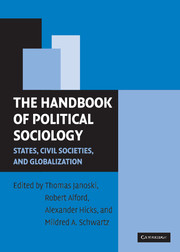Book contents
- Frontmatter
- Contents
- Preface
- Contributors
- Political Sociology in the New Millenium
- PART I THEORIES OF POLITICAL SOCIOLOGY
- 1 Rulemaking, Rulebreaking, and Power
- 2 Neopluralism and Neofunctionalism in Political Sociology
- 3 Conflict Theories in Political Sociology
- 4 Institutionalist and State-Centric Theories of Political Sociology
- 5 Culture, Knowledge, and Politics
- 6 Feminist Theorizing and Feminisms in Political Sociology
- 7 The Linguistic Turn: Foucault, Laclau, Mouffe, and Žižek
- 8 Rational-Choice Theories in Political Sociology
- 9 Theories of Race and the State
- PART II CIVIL SOCIETY: THE ROOTS AND PROCESSES OF POLITICAL ACTION
- PART III THE STATE AND ITS MANIFESTATIONS
- PART IV STATE POLICY AND INNOVATIONS
- PART V GLOBALIZATION AND POLITICAL SOCIOLOGY
- References
- Name Index
- Subject Index
7 - The Linguistic Turn: Foucault, Laclau, Mouffe, and Žižek
Published online by Cambridge University Press: 05 June 2012
- Frontmatter
- Contents
- Preface
- Contributors
- Political Sociology in the New Millenium
- PART I THEORIES OF POLITICAL SOCIOLOGY
- 1 Rulemaking, Rulebreaking, and Power
- 2 Neopluralism and Neofunctionalism in Political Sociology
- 3 Conflict Theories in Political Sociology
- 4 Institutionalist and State-Centric Theories of Political Sociology
- 5 Culture, Knowledge, and Politics
- 6 Feminist Theorizing and Feminisms in Political Sociology
- 7 The Linguistic Turn: Foucault, Laclau, Mouffe, and Žižek
- 8 Rational-Choice Theories in Political Sociology
- 9 Theories of Race and the State
- PART II CIVIL SOCIETY: THE ROOTS AND PROCESSES OF POLITICAL ACTION
- PART III THE STATE AND ITS MANIFESTATIONS
- PART IV STATE POLICY AND INNOVATIONS
- PART V GLOBALIZATION AND POLITICAL SOCIOLOGY
- References
- Name Index
- Subject Index
Summary
Poststructuralist discourse theory is a tool for analyzing the more or less sedimented rules and meanings that condition the political construction of social, political, and cultural identity. It begins with the assertion that what exists only becomes intelligible when it is joined with a specific form which constitutes its identity. The formation of identity is not grounded in some metaphysical instance like God, Nature, Man, Reason, or the Iron Laws of Capitalism. Instead, discourse theory subscribes to an antiessentialist ontology, which is opposed to the idea of a self-determining center that structures society and defines identity while itself escaping the process of structuration. Hence it asserts that identity is constructed in and through a multiplicity of overlapping language games. Following Ludwig Wittgenstein (1959), language is conceived neither as a medium for the representation of an extralinguistic reality nor as a medium for the expression of our inner thoughts and emotions. Rather, it constitutes a rulebound system of meaning and action that conditions the ultimately political construction of identity.
The emphasis on the constitutive role of language clearly indicates that discourse theory is a part of the linguistic turn in the social sciences. However, the point of discourse theory is neither to study how we actually speak and write nor to investigate the rules that we draw upon when speaking or writing. Discourse theory aims at a much broader analysis of the construction of discursive forms.
- Type
- Chapter
- Information
- The Handbook of Political SociologyStates, Civil Societies, and Globalization, pp. 153 - 171Publisher: Cambridge University PressPrint publication year: 2003



